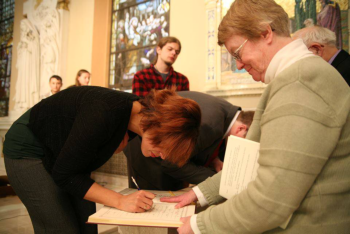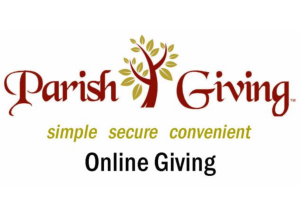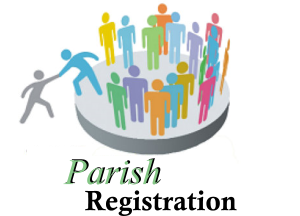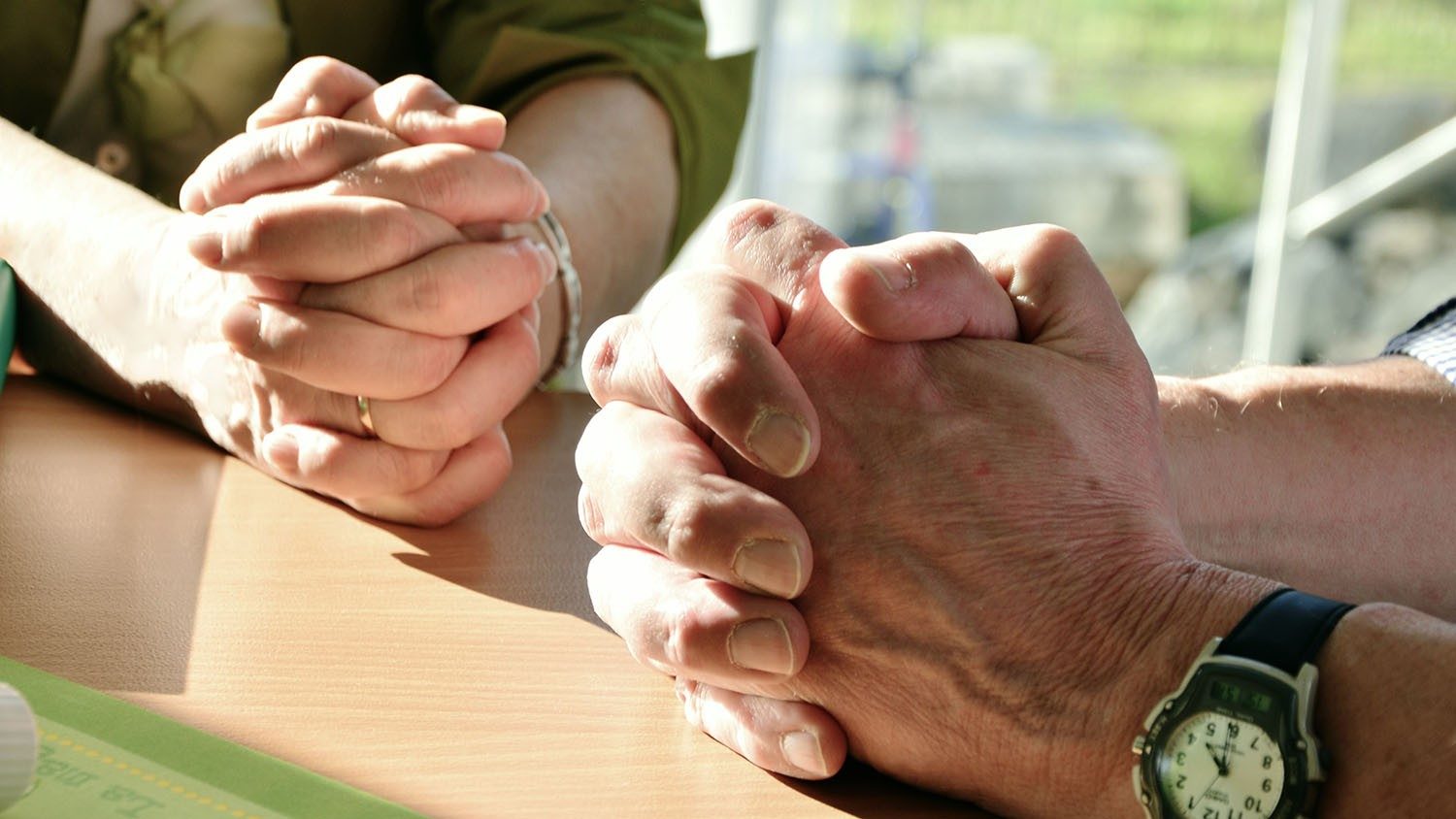RITE OF CHRISTIAN INITIATION FOR ADULTS
 How do I become a Catholic?
How do I become a Catholic?
Through a process called the Rite of Christian Initiation of Adults, or RCIA, for short. It is not a program (rigidly structured with fixed time limits) it is a process -- a process of faith formation that recognizes the uniqueness of each individual's faith journey.
So the RCIA process is unique for me?
Yes! However, it is not a totally free-form, unstructured experience. And although many factors influence your faith formation in subtle ways, there are a few key aspects of your faith journey that determine, in broad strokes, the way in which your RCIA teachers will assist you. The first important thing is whether or not have you been baptized into the Christian faith.
If you have had a valid baptism, you are on the path to becoming a Candidate; if you have not, you are on the path to becoming a Catechumen. In either case, the path leads to becoming Catholic -- in full communion with the Roman Catholic Church.
The second important thing is the amount of formal Christian religious education you previously received. (This is called catechesis.)
How long does the RCIA process take?
Because the process respects you as an individual, it is difficult to give a time frame at the outset. You do not want to rush your faith journey. One person's time frame is a little different from another's.
If you have not been baptized, the process usually takes a year; ending at the Easter Vigil.
If you have already been baptized into another Christian faith tradition, you may require less time, depending on the faith formation (catechesis) you previously received and your present involvement in the practice of your faith.
Mary, Mother of God parish wants to listen to both your needs and desires; it also does not want to deprive you of the opportunity to discern God's gifts to you at this important moment in your life. Time is needed for your faith formation as an adult.
How do I know if my baptism was valid?
For Baptism to be valid it must be administered with the proper 1) form, 2) matter, and 3) intention.
- The proper form is that the baptism is administered "in the name of the Father, Son, and Holy Spirit." These precise words must have been spoken.
- The proper matter is water. Ideally, immersion in, or the pouring of water over the person is required. If the water was only sprinkled, and did not flow or touch the skin, the baptism may or may not be considered valid; in this case, further investigation and consideration would be warranted.
What if I am unsure if my baptism was valid?
In cases where all reasonable attempts to verify the validity of a baptism fail to confirm or deny the validity of a person's baptism, the Church does allow a conditional baptism.
What is the Catechumen's path like?
The process is composed of five stages:
- The Pre-catechumenate, or inquiry period, consists of informal meetings to explain the process and answer questions about the Roman Catholic Church and the local parish. This is a time for Inquirers to follow their heart's desire and decide whether they wish to continue.
- The instruction period, also called the Catechumenate, begins with The Rite of Welcome. At this time, Inquirers are formally welcomed by the Parish community and become Catechumens. They enter a period of more structured faith formation; they attend Sunday Mass every week. They meet regularly with other Catechumens (and Candidates), and RCIA Catechists to discuss the scripture readings of the week and other topics of importance such as the Sacraments, the meaning of the Mass, and Catholic morality and social actions.
- The Rites of Sending and Election (First Sunday in Lent), in which the Parish sends the Catechumens to the Bishop who, on the part of the entire Catholic Church, accepts them as the Elect who will be received into the Church at Easter. At this time the Church enters the Lenten period in preparation for Christ's death and Resurrection. For the Elect this is a period of spiritual enlightenment and preparation.
- At the Church's greatest feast, the Vigil of Easter, the Elect will receive the sacraments of initiation (Baptism, Confirmation, and Eucharist).
- Mystagogy, the fifty day period between Easter and Pentecost, the new members of the Church community (called neophytes) begin a time of reflection and commitment to live out their sacramental call to service in the community.
What is the Candidate's path like?
The process is composed of three stages:
•The inquiry period, which consists of informal meetings to explain the process and answer questions about the Roman Catholic Church. This is a time for Inquirers to follow their heart's desire and decide whether they wish to continue.
•The instruction period (or catechesis), in which inquirers are formally welcomed by the Parish community and become Candidates. They enter a period of more structured faith formation; they attend Sunday Mass every week. They meet with other Candidates (and Catechumens) and RCIA Catechists to discuss the scripture readings of the week and other topics of importance such as the Sacraments, the meaning of the Mass, and Catholic morality and social actions.
At such time as both the Candidate and the RCIA ministers feel true formation has occurred, the Candidate will be invited to receive the sacraments of initiation (Confirmation, and Eucharist) at a Sunday Liturgy, usually on Easter Sunday morning.
Mystagogy, a fifty day period which begins immediately after the sacraments of initiation. It is a time for new members of the Church community, called neophytes, to reflect upon their initiation experience and commitment to live out their sacramental call to service in the community.
How much of a time commitment is it?
Once an Inquirer becomes a Candidate or Catechumen, he or she must be willing to attend a Sunday Mass and a weekly “class” or instruction session to discuss the Scriptures as well as Catholic topics. This takes about an hour and a half.
Are there any costs associated with RCIA?
No. There are no fees, tuition, or charges of any kind.
I am engaged to a Catholic. Can I become Catholic in time for our wedding?
If you are engaged, the deepening of your relationship with your fiancée and the preparation for your wedding take time. The deepening of your relationship with the Church community and the preparation for your baptism or full membership in that community also take time. The faith journey to become a Catholic takes time and energy. It may or may not be possible for both journeys to arrive at a particular calendar date at the same time.
Can my children be baptized (or received) into the Church when I am baptized (or received) into the Church?
The Catholic Church prepares school-age children for Baptism, Confirmation and Eucharist in a process similar to the one that adults take part in. Children have a sponsor and participate in the same stages and celebrations that adults participate in. In Mary, Mother of God Parish, special age-appropriate sessions are available for children. Children who have not yet reached school age may be baptized; or, if already baptized, they may be received into the Church along with their parents without the need for a special process.
I (or my spouse) have been married before. Does that present a problem to my becoming a Catholic?
Ordinarily the Catholic Church assumes that a person's first marriage is a valid marriage. If you (or your spouse or your fiancée) have been previously married, it is important to talk your situation over with someone who is informed of particular marriage laws of the Church. Every marriage situation is different. Sometimes an annulment may be necessary. The annulment is a formal procedure of the Catholic Church. It looks for evidence that some essential dimension of a valid Christian marriage was missing from the beginning. It does not say that a civil marriage never occurred, or the children born of that marriage are illegitimate. Because the annulment process takes some time to complete, begin talking with a pastoral minister as soon as you sense you are truly drawn to the Catholic Church.
I understand that I need a sponsor, is this true?
Yes, each RCIA candidate needs a sponsor. As Jesus taught his disciples the importance of community, it is significant that we walk this faith journey with companions, who participate in the process and help you find the resources and answers that you may have on your journey.
What is a sponsor?
A sponsor is a practicing Catholic who has received the three Sacraments of Initiation (Baptism, Eucharist and Confirmation), who is a spiritual companion and support on the journey, and serves as a mentor in the Christian life.
Ideally, your sponsor would not be your spouse or fiancé. The intensity of that relationship makes it difficult to relate to the other person as a sponsor or candidate.
What do sponsors do?
The sponsor converses regularly with the RCIA participant about his or her ongoing process of faith development. The sponsor should be a good listener and should help a candidate to know where God is leading without being a salesman.
At the Easter Vigil where the Sacraments of Initiation are celebrated, the sponsor has a particular role in the liturgy. A sponsor likewise takes part in the ceremonies that occur in the course of the RCIA process.
How do I get a sponsor?
Some people who come to enter the Church have done so because of the example and influence of a Catholic relative or friend. It would be very appropriate to ask such a person to be your sponsor.
You are free to ask any confirmed and practicing Catholic to be your sponsor.
However, a spouse or fiancé is, in most cases, probably too intensely invested in being a spouse or fiancé to act in the capacity of a sponsor.
If you don’t have a Catholic friend who can serve as your sponsor, we supply one for you by matching you with a member of the parish.
Whom do I contact to begin Inquiry?
Inquiry sessions are held when an inquiry has been made either by phone or in person. Contact Sister Therese Mary at Mary, Mother of God Parish for more information or simply to inquire!
Phone: (570) 342-4881
Mail:
Mary, Mother of God Parish
316 William Street
Scranton, Pennsylvania 18508
E-mail:






